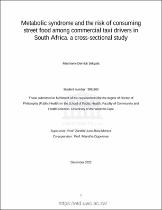| dc.contributor.advisor | Mchiza, Zandile | |
| dc.contributor.author | Sekgala, Machoene Derrick | |
| dc.date.accessioned | 2023-05-11T06:59:34Z | |
| dc.date.available | 2023-05-11T06:59:34Z | |
| dc.date.issued | 2022 | |
| dc.identifier.uri | http://hdl.handle.net/11394/9910 | |
| dc.description | Philosophiae Doctor - PhD | en_US |
| dc.description.abstract | Minibus taxi drivers in South Africa are eminent street food (SF) consumers with
these affordable foods easily accessible at taxi ranks. Regular SF consumption, in combination,
with unhealthy lifestyles associated with taxi driving, predisposes them to develop metabolic
syndrome (MetS). Detecting the early onset of MetS allows for early intervention, which may slow
the progression to various health consequences. The primary aim of the thesis was to describe the prevalence, extent, and determinants of
MetS among male minibus taxi drivers, 20 years and older operating in the Cape Town metropole
who rely on SF for their daily calorie and nutrient intake. A secondary aim was to use these
outcomes to develop recommendations for targeted interventions to improve their health status
and lifestyle. | en_US |
| dc.language.iso | en | en_US |
| dc.publisher | University of the Western Cape | en_US |
| dc.subject | Public health | en_US |
| dc.subject | Metabolic syndrome | en_US |
| dc.subject | Diabetes | en_US |
| dc.subject | Dietary | en_US |
| dc.subject | South Africa | en_US |
| dc.subject | Taxi drivers | en_US |
| dc.title | Metabolic syndrome and the risk of consuming street food among commercial taxi drivers in South Africa. A cross-sectional study | en_US |
| dc.rights.holder | University of the Western Cape | en_US |

